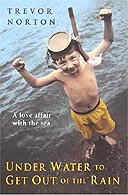
Under Water to Get Out of the Rain: A Love Affair with the Sea
by Trevor Norton
385pp, Century, £12.99
Trevor Norton's beautifully written memoir of a life spent probing and pondering the sea depths derives much of its power from its observations of the world ashore. His early memories of a vanished world have the charm of old hand-coloured postcards, while his later chapters carry the TV news ugliness of the present world's descent into anarchy.
Norton grew up in Whitley Bay on the North Sea coast, in impeccable circumstances for a future marine biologist. "We lived on the second floor and viewed the sea through windows misted with salt. At night the beams from the lighthouse swept my ceiling." His family went south, to Yorkshire, for their holiday, and stayed in a Scarborough guesthouse where they were locked out no matter what the weather until teatime. Despite these credentials, it was Hans Hass's TV adventure programme, Diving to Adventure, and Hass's "luscious" wife Lotte, that fixed Norton's fate. "In one film I'm almost sure she peeled and swallowed a banana underwater."
As soon as possible, he bought a diving mask and snorkle and plunged into the icy sea. What he saw there is described with a novelist's sensibility and eye for detail: "I went down again and again. Suddenly, while I was below, something stabbed the water in front of me, a dark javelin in a cone of bubbles. It transformed into a cormorant. Having misfished for a sand eel, it escaped back into the sky ... This, I decided, was the real world." From this baptism, Norton charts his course from nascent to accomplished marine biologist, and to the once pristine shores where this obsession took him. He seems to have gone around the world in pursuit of slimy creatures and marine organisms, and is fortunate to have done much of this before the age of mass tourism. "In exploration," he writes, " timing is everything. Yesterday's expedition is today's excursion and tomorrow's packaged tour."
Norton's chapters covering his amphibious life in places as far apart as Yemen and Japan, Colonsay and California, are rich accounts of the worlds he has known both above and below the surface of the sea. He tells us of the singular characters whose imagination and obsession have made them part of the history of marine biology, and the ancillary notables who have walk-on parts: Philip Henry Gosse, the David Attenborough of Victorian England, who came up with a crackpot creationist answer to Darwinism (just as Adam had been created with a navel, indicating a mother rather than God as his "parent", so had God placed in the earth all the signs of an evolution pre-dating Creation, so we mustn't really take it too seriously). Here too are Ed Ricketts, John Steinbeck's pal in California, who served as the model for Doc, the marine biologist in Cannery Row; and the famous European refugees interned on the Isle of Man during the second world war: Kafka's lover, Dora Diamant, Lord Weidenfeld, Charles Forte, Tiny Rowland.
Naturally, Norton has a fine feel for the pond that spawned him, the British seaside. "The weather was always against British resorts ... Their success in the past was down to marketing our inclement climate as a virtue." Seawater, which was known principally for drowning people, was supposed to be curative in small doses. Sufferers of "ruptures, rheumatism and madness ... phrenzy and nymphomania" immersed themselves at seaside spas. "The shock of those icy waters was fundamental to the cure" for the "terror and Surprize" they inflicted.
Many seaside towns built long piers to entice patrons out over the freezing water, for "entrepreneurs soon realised that visitors would pay twopence, as Thackeray said, 'to go out to sea and pace this vast deck without need of a basin'". Piers were also celebrated for the aphrodisiac effect that caused young women to "give themselves up to a general abandon ..." But after the second world war, cold water lost its appeal and the Mediterranean pulled holidaymakers away from British resorts.
Losses are grimmer elsewhere. Norton provides a brutal picture of what has happened to the frontier we once thought of as infinite and indestructible. From the sweet innocence of boyhood at the seashore he takes us, finally, to the ruination of the Philippines, by grotesque Americanisation ashore and below the water by dynamite and cyanide fishing.
But Norton's book is too full of life to be without hope. And his literate, witty, luminous prose makes this a marine biology to cuddle up to. This is a book to take to the seashore, and to bed.
· Peter Nichols's Evolution's Captain is published by Profile. To order Under Water to Get Out of the Rain for £11.99 with free UK p&p call Guardian book service on 0870 836 0875. www.theguardian.com/bookshop

